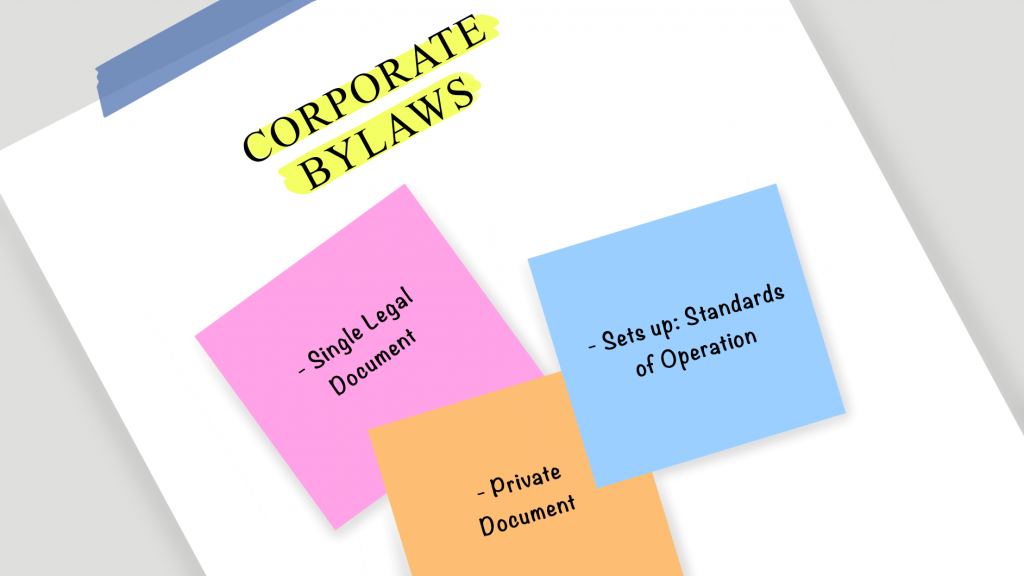Corporate bylaws and operating agreements act as a guiding force in navigating the complex ecosystem of a company. Think of them like an internal manual that is unique to each company: It lays out the rules of operation and establishes the details of ownership, management, meetings, roles of officers, and more. For corporations, including c-corps and s-corps, this key document is called corporate bylaws, while for LLCs, it’s known as an operating agreement.
Let’s dig a little deeper into the functions of these two documents, whether they are required for companies operating in your state, and why they might be helpful.
Table of Contents
Corporate Bylaws
When a company is legally incorporated, corporate bylaws are one of the first things that its board of directors will establish. Written as a single legal document, it sets up the standards of operation for internal purposes. Unlike articles of incorporation, which are in the public record, bylaws are considered private documents and do not need to be filed with the state or any government agency.1
Topics typically addressed in corporate bylaws include the elections and functions of directors and corporate officers, when and where shareholder and board meetings are held, how to make amendments to the bylaws, methods of fiscal accounting, and more.2

Are They Required?
It varies by state. Currently, 31 states require corporate bylaws, while the following states do not have legislation that deem them mandatory:
Alaska, California, Colorado, Delaware, Illinois, Iowa, Kansas, Louisiana, Michigan, Minnesota, Mississippi, Missouri, Nevada, North Dakota, Ohio, Pennsylvania, Rhode Island, Utah and Wisconsin.3
Important Sections to Include in Bylaws
While the content of corporate bylaws will differ based on the size and type of the company, they generally cover many of the same provisions. Below are some of the most important sections to include:
-
Official Name and Statement of Purpose
This section lays out the basic “who” and “why” of the company: What name will the company be known as, what types of services or products does your business provide, and who are the target customers?4
-
Board of Directors and Quorum Protocol
A company’s board of directors makes big-picture policy and hiring decisions on behalf of the corporation. Bylaws should detail how many directors serve on the board, the length of their terms, and how they are elected.
In addition to determining when and how directors can call a board meeting, bylaws should also establish what constitutes a quorum, the minimum number of board members who must be present to conduct official business on behalf of the corporation.5
-
Company Officers and Their Roles
A corporation’s CEO, CFO, president, vice president, secretary and treasurer are all considered officers of the company. As opposed to the board of directors, these officers typically oversee the day-to-day operations of the business. It’s wise to specify the roles and responsibilities of each officer, how they will be elected or appointed, and what the procedure is for removal.
-
Shareholders, Stocks, and Dividends
Shareholders own parts of a company by holding stock or equity in the form of shares. Bylaws can detail the classes of available stock, ownership rights of each respective class, how stock certificates are issued, and who is entitled to receive them.
In addition to providing the details of the annual shareholders meeting as well as voting rights, bylaws should also include information on dividends, which may be paid out to shareholders in cash or in additional shares.6
-
Indemnification
To address potential liability issues, bylaws often include an indemnification clause, granting the corporation authority to protect and indemnify the board of directors and officers against losses or damages in connection with the company.7
How to Change Bylaws
As a company transforms over time, bylaws may need modifications in order to reflect the current needs of the business. That’s why it’s important to include an agreed-upon procedure and voting process for approving and adopting amendments in the original bylaws.
Operating Agreements
Much like corporate bylaws, an operating agreement serves as a key internal document for LLCs by outlining the functional and financial standards that will govern the ins and outs of the business. After the document is signed by the business owners (also known as members), it acts as an official contract binding them to the rules. Similar to bylaws, operating agreements do not need to be made public.8
Are They Required?
Operating agreements are legally required in only five states: California, Delaware, Missouri, Maine, and New York. However, it is highly recommended that LLCs draft an operating agreement regardless of state law; without it, businesses must abide by the default terms imposed by the state, which may be general in nature and not applicable to some businesses.9
Important Sections to Include in Operating Agreements
As a legally binding document, operating agreements typically contain many important provisions that detail the unique logistics of a company. Below is a list of common sections that are included in an operating agreement:9
- Percentage of Members’ Ownership
- Voting Rights and Responsibilities
- Powers and Duties of Members and Managers
- Distribution of Profits and Losses
- Meeting Procedures
- Rules for Buyouts and Buy-Sells
How to Change Operating Agreements
The initial operating agreement should lay out the procedure for making amendments, such as voting requirements and how many members are required to sign off on the change for it to become effective. Amendments are typically not required to be filed with the state business authority, but specific requirements vary state by state.10
Sources
- https://corporatefinanceinstitute.com/resources/knowledge/finance/company-bylaws/
- https://lawshelf.com/shortvideoscontentview/governing-the-corporation-corporate-bylaws
- https://www.harborcompliance.com/information/corporate-governance-by-state
- https://www.legalnature.com/guides/top-10-provisions-to-include-in-your-corporate-bylaws
- https://www.boardeffect.com/blog/what-constitutes-a-quorum/
- https://www.investopedia.com/terms/d/dividend.asp
- https://www.americanbar.org/groups/business_law/resources/business-law-today
- https://www.sba.gov/blog/basic-information-about-operating-agreements
- https://www.investopedia.com/terms/l/llc-operating-agreement.asp
- https://info.legalzoom.com/article/can-llc-operating-agreement-be-amended

